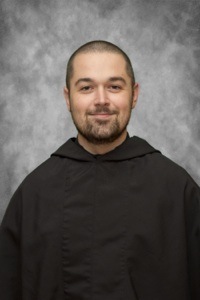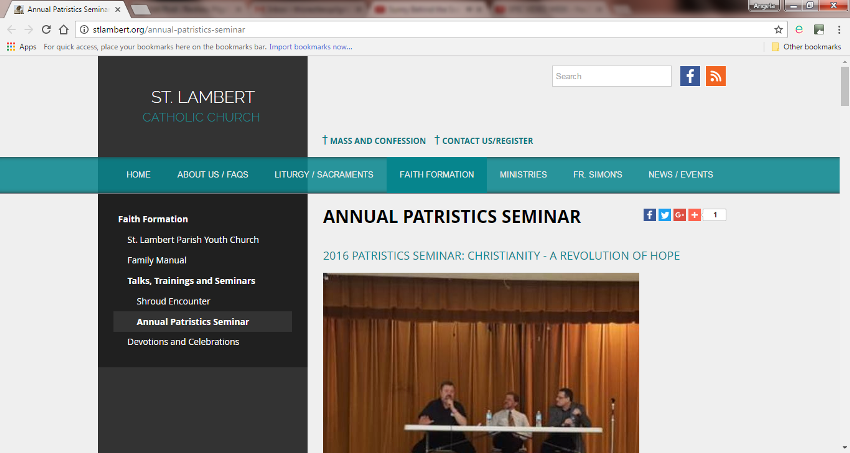Category: Church Fathers
Patristics Seminar
I recently saw Mike Aquilina (happy birthday!) comment on Facebook that he was just returning from speaking at a conference on the Early Church Fathers. I had no idea that such things existed! How did I not know?!
Anyway, it turns out that there’s an annual Patristics seminar in October at St. Lambert’s Catholic Church near Chicago, Illinois:
Although I’ve missed the seminar for this year, fortunately the parish’s website has the audio from the talks, as well as from their 2013 seminar with Dr. John Bergsma:
2016: A Revolution of Hope (Mike Aquilina & Dr. Jim Papandrea)
The First Pro-Life Movement: A Revolution in Human Dignity
The Inevitable Counter-Revolution: How and Why the Church was Persecuted
Saving Bodies, Saving Souls: A Revolution in Health Care
The Revolution of Religious Liberty: Myth and Reality
2013: Origins of Jewish and Christian Worship (Mike Aquilina & Dr. John Bergsma)
A Rite Tun
Outdoing Solomon
Language of Angels
The Garden and the Temple
Unity, Liberty, Charity


I was recently involved in a Facebook discussion where someone attributed the following quotation to St. Augustine:
“In essentials, unity; in non-essentials, liberty; and, in all things, charity”
I have previously heard these attributed to St. Augustine, but I had always been extremely doubtful of its origin. After commenting to this effect, someone else on the thread said he thought it was John Wesley, which sounded a bit more like it. However, after some digging, I found a post which confirmed that it definitely wasn’t Wesley.
After further research, I found that many people attributed these words to a relatively obscure German Lutheran theologian from the seventeenth century named Rupertus Meldenius, also known as Peter Meiderlin), who wrote a tract on Christian Unity (1627). However, after further digging, it appears that the earliest usage of the phrase is in 1617 by Marco Antonio de Dominis, Archbishop of Split, in his anti-Papal work “De Republica Ecclesiastica”.
Knowing and loving Augustine
 It’s Theology On Tap time again!
It’s Theology On Tap time again!
In this previous round of talks, a local San Diego priest, Fr. Mark Menegatti gave a talk on one of my favourite Early Church Fathers.
Fr. Menegatti’s talk was on St. Augustine of Hippo. This was rather appropriate since Fr. Menegatti is himself an Augustinian! His talk was entitled: “Why everyone can read, know and love the Theologian Saint Augustine”
As usual, the talk is available for download below:
Main Talk (Download)
Audio Player
Q&A (Download)
Audio Player
What does it take to be a mother of a Saint?
 Today is Mother’s Day in America, so I’d like to say a few words about one of my favourite mothers in history. St. Monica was the mother of St. Augustine, the great Father of the Early Church. She was born in Tagaste, North Africa, to a Christian family. When she reached a marriageable age, she was given in marriage to Patricius, a pagan of infidelity and foul temper. Monica endured a lot during their marriage, but through her patience and kindness, Patricius underwent conversion and was baptized a year before his death.
Today is Mother’s Day in America, so I’d like to say a few words about one of my favourite mothers in history. St. Monica was the mother of St. Augustine, the great Father of the Early Church. She was born in Tagaste, North Africa, to a Christian family. When she reached a marriageable age, she was given in marriage to Patricius, a pagan of infidelity and foul temper. Monica endured a lot during their marriage, but through her patience and kindness, Patricius underwent conversion and was baptized a year before his death.
Monica and Patricius had three children, a son called Navigius, a daughter called Perpetua, and another son, Augustine. Navigius appears to have been a faithful son, Perpetua later entered the religious life, but Augustine? Well, his path in life was something of a bumpy ride…
While away at school in Carthage, Augustine had what we might call today “The True College Experience”. He partied a lot, took a mistress and became a follower of the Manichees (not to be confused with manatees!), a belief system which bore the marks of what we would recognize today as something akin to New Age. Having excelled in his education, Augustine went in search of fame and fortune.
The future Saint was not exactly the greatest son to his mother. For example, when he discovered that Monica was intending to accompany him to Rome, he snuck away on an earlier ship, abandoning her at the port! During all these tumultuous years Monica prayed, fasted and wept for her son. When she sought help from a local bishop, she was told “God’s time will come…it is not possible that the son of so many tears should perish”.
The rest of Augustine’s story is well worth recounting, but I do not have room here today. To cut a long story short, he eventually embraced the Catholic Faith and became a priest and bishop. While they were together in Ostia, Monica said these words to her son:
“Son, …now that my hopes in this world are satisfied, I do not know what more I want here… There was indeed one thing for which I wished to tarry a little in this life, and that was that I might see you a Catholic Christian before I died. My God has answered this more than abundantly…” – The Confessions, Book IX, Chapter IX
Five days later Monica fell ill and it was clear that she was dying. Augustine’s brother, Navigius, said he didn’t wish her to die abroad, particularly since earlier in her life, Monica had spoken of her great desire to be laid to rest with her husband. However, now on the threshold of death, she responded:
“Lay this body anywhere, and do not let the care of it be a trouble to you at all. Only this I ask: that you will remember me at the Lord’s altar, wherever you are” – The Confessions, Book IX, Chapter XI
Monica died a few days later. I would like to close this post with Augustine’s own words as he grieved for the mother:
I closed her eyes; and there flowed in a great sadness on my heart… I was full of joy because of her testimony in her last illness, when she praised my dutiful attention and called me kind, and recalled with great affection of love that she had never heard any harsh or reproachful sound from my mouth against her. But yet, O my God who made us, how can that honour I paid her be compared with her service to me? – Book IX, Chapter XII
Paternal Protestations
 As you’ll see from the categorization of this entry, this is an apologetics post. In this article I am going to be defending the use of the writings of the Early Church Fathers in demonstrating the historicity and veracity of the Catholic Faith.
As you’ll see from the categorization of this entry, this is an apologetics post. In this article I am going to be defending the use of the writings of the Early Church Fathers in demonstrating the historicity and veracity of the Catholic Faith.
The problem with writing a defence of anything is that, even with the best will in the world, it’s still easy to come across as though you’re attacking those to whom you are responding.
So, if you’re reading this post and you feel that it comes across as Protestant-bashing then I’m truly sorry. This is certainly not my intention. In fact, this was one of the reasons why I penned the Ecumenical Apologist entry, to try and dispel such charges. In this post I simply want to present something of an explanation as to why one should care about the Early Church Fathers.
Forgotten Treasure
On the occasions when I’ve been engaged in apologetics with non-Catholic Christians I’ve often mentioned the Early Fathers. I’m usually met with blank stares. The Early who?! Unfortunately, like Catholics, our separated brethren haven’t read much of the Early Church Fathers either
One of my hopes for this blog is that it will encourage both groups to read the Fathers and learn more about our common heritage. The Early Church Fathers are fundamentally important in ecumenical work since they were living in a time prior to the divisions of the Great East/West Schism and the Reformation.
On the odd occasion when I do encounter non-Catholics who have heard of the Fathers, they usually only have second-hand information and have actually not read any of their writings. This is not true of all non-Catholics, of course, but in my limited experience it has at least been the larger majority. It should come as no surprise then, upon meeting Catholic or Protestant Christians unfamiliar with the Fathers, I immediately encourage them to begin by reading the letters of my favourite Early Church Father, St. Ignatius of Antioch
How You Shouldn’t Treat The Fathers
Yesterday, Joe over at Shameless Popery wrote a great post entitled Three Ways You Shouldn’t Treat The Church Fathers. Here were his three points:
Wrong Way #1: Ignoring or Fearing the Church Fathers
Reason: It Reduces Christianity to Incoherence
Wrong Way #2: Exploiting the Church Fathers
Reason: It Doesn’t Treat the Fathers Honestly
Wrong Way #3: Treating the Church Fathers as Infallible
Reason: The Fathers Occasionally Disagree
In this blog post I would like to talk a little bit about the third item. In apologetic exchanges I have often had to correct the non-Catholic assertion that we regard the Fathers as infallible. We don’t. As Joe points out, the Fathers occasionally disagree. It is on this point that I sometimes hear another objection. Here is what someone recently wrote to me:
“The fathers didn’t agree on every matter of doctrine so their opinion is no more reliable than anyone else’s. There were some heated arguments between some of them. In what way are they different from two modern-day non-Catholic pastors disagreeing over a certain interpretation of the Bible?“
I would like to take the rest of this blog entry to address this objection.
Let’s talk about love
 The Second Reading at Mass today is one of those better known Scripture passages, St. Paul’s praise of the virtue of love, found in his First Letter to the Corinthians.
The Second Reading at Mass today is one of those better known Scripture passages, St. Paul’s praise of the virtue of love, found in his First Letter to the Corinthians.
“Love is patient, love is kind. It does not envy, it does not boast, …“. I’m pretty sure I don’t need to quote the rest of this passage as you will have certainly heard it at…every…single…wedding…you have ever attended
It is my guess that St. Paul’s great hymn of love was the inspiration for a section of an epistle written by St. Clement of Rome at the end of the First Century. A few decades after St. Paul’s death, St. Clement wrote a letter to that same troublesome Corinthian congregation to address that community’s latest round of problems. Some young whipper-snappers had usurped control of the church and deposed their clergy. The Bishop of Rome wrote to them, urging the members of the church to obedience and to brotherly love.



